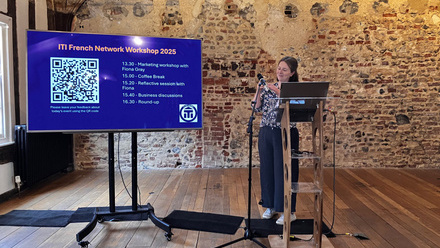Rule of three
Hayley Smith reports on our ‘Words that wow’ workshop and puts her learning into practice on the page.
Three words, three stressed syllables and some alliteration walked into a bar...Just kidding. No bar. But they are all in the title of ITI’s workshop ‘Words that wow’ with Joachim Lépine, which I took part in last summer. The title was a promising start.
Joachim, or Joe, is a well-known presenter on the ITI workshop-and-webinar scene, and for good reason. I had already attended his ITI short course ‘What makes English… English?’ in 2022 and was impressed by his personable approach, confident presentation style and language-centric content. He also has plenty of knowledge and experience to share. What struck me most about both of Joe’s sessions is that he really cares about crafting excellent English – amen to that.
Pizzazz to take away
Interactive sessions at the wordface are what I crave most in my daily work, with little in the way of collective brainstorming in our usually solitary lexical meanderings, so I felt I’d struck CPD gold with this workshop.
The aim of the session was to work on a series of short extracts in English and make them more compelling, adding some pizzazz to bland wordage. While this is something we tend to do naturally when drafting our own pieces of writing, it’s easy to overlook when translating.
Joe followed a simple three-step structure: paraphrase-brainstorm-unveil, based around a practical how approach and not a theoretical what, to cement the ideas in our minds. As participants suggested ways to turn clunky paraphrases into short snappy verbs, and sniffed out awkward turns of phrase devoid of meaning, the chat was a hive of activity. There was real energy in the group. For me, this kind of session is best enjoyed live, but the format could also be replicated as a form of self-directed CPD.
Working with English and with other Englishes
While Joe’s expertise is in translating from French into Canadian English, his workshop is useful for translators working from any source language into English. As Joe was speaking to a mainly UK audience for ITI, it was interesting to see discussions emerge around different Englishes. Unsurprisingly, there were some turns of phrase that we felt were more appropriate to a North American reader than a British one. All part of the fun.
The attentive audience raised the importance of always considering the target reader, particularly as regards the use of phrasal verbs. These are known to be tricky for non-native speakers: they are also markedly English and, therefore, often effective in sharpening style or regulating rhythm. We also took into consideration the need to preserve the text’s register and tone, as we worked through Joe’s (copious!) examples.
Keeping the reader awake in the sunlight
While Joe had tinkered with his English texts for the purposes of our session, examples of source language words that can manoeuvre us into monotony abound. Any translators well versed in the financial press will be familiar with upticks and downturns, soaring taxes and shrinking markets, and prices plummeting or, more likely, skyrocketing.
One standout example is the omnipresent duo increase/decrease. English offers a vast array of alternativesto convey these meanings, so we don’t have to religiously resort to the run-of-the-mill increase/decrease. Joe reminded us we can have fun basking in the lexical sunlight and help the reader not fall asleep, while still conveying the facts.
We left the workshop with a tangible takeaway treat, too: access to a Trello board packed with inspiration. It’s a sort of version 2.0 of my trusty handwritten notebook where I jot down good words or turns of phrase. I’m sure it will serve as a great resource for keeping wow-worthy words front and centre on any occasion, especially when the mot juste stalls somewhere before reaching the tip of my tongue. Bravo, Joe. Variety really is the spice of life.
P.S. This article is peppered with some of Joe’s words that wow. Can you spot them?
This article first appeared in the November-December edition of ITI Bulletin.






